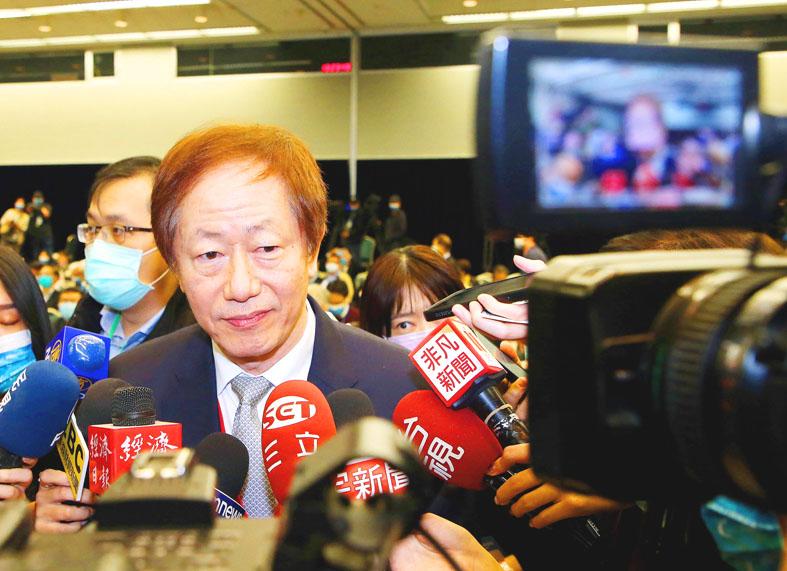There are probably not many people who believe that Taiwan is unstable because of geopolitical factors, Taiwan Semiconductor Manufacturing Co (TSMC, 台積電) chairman Mark Liu (劉德音) said yesterday in Taipei in response to comments by Intel’s top executive.
Intel CEO Pat Gelsinger on Wednesday told the Fortune Brainstorm Tech summit in California that the US government should support a sustainable semiconductor supply chain in the US, in part because “Taiwan is not a stable place.”
With China sending 27 military warplanes into Taiwan’s air defense identification zone on Sunday, Gelsinger asked: Does that “make you more comfortable or less if you’re now dependent on Taiwan as the singular source of technology for the most critical aspect of our human existence and our national security and economy for the future?”

Photo: CNA
BEST COMBINATION
Asked about the comment, Liu said: “There’s nothing that needs to be addressed.”
“TSMC does not speak ill of other companies in the industry,” Liu said, adding that there were probably not many people who believed Gelsinger’s argument.
Geopolitical tensions might have a short-term impact, but Taiwan could help create a brilliant decade for the global semiconductor industry, with the best technology and the best manufacturing ecosystem, he said.
TSMC’s construction of a plant in Arizona is on schedule and is likely to begin mass production, mainly deploying 5-nanometer technology, during the first quarter of 2024, he said.
The company also plans to begin building a factory in Japan’s Kumamoto Prefecture next year after announcing a partnership with Sony Semiconductor Solutions Corp early last month, he said.
Despite labor shortages that have emerged in Japan, TSMC expects to begin mass production using 22-nanometer and 28-nanometer processes by the end of 2024, Liu said.
GROWING INDUSTRY
Global demand for semiconductors would continue to grow, he said, adding that the production value of the global semiconductor sector would reach US$1 trillion in 2030, creating US$3 trillion to US$4 trillion in value in the electronic products market.

Sweeping policy changes under US Secretary of Health and Human Services Robert F. Kennedy Jr are having a chilling effect on vaccine makers as anti-vaccine rhetoric has turned into concrete changes in inoculation schedules and recommendations, investors and executives said. The administration of US President Donald Trump has in the past year upended vaccine recommendations, with the country last month ending its longstanding guidance that all children receive inoculations against flu, hepatitis A and other diseases. The unprecedented changes have led to diminished vaccine usage, hurt the investment case for some biotechs, and created a drag that would likely dent revenues and

Macronix International Co (旺宏), the world’s biggest NOR flash memory supplier, yesterday said it would spend NT$22 billion (US$699.1 million) on capacity expansion this year to increase its production of mid-to-low-density memory chips as the world’s major memorychip suppliers are phasing out the market. The company said its planned capital expenditures are about 11 times higher than the NT$1.8 billion it spent on new facilities and equipment last year. A majority of this year’s outlay would be allocated to step up capacity of multi-level cell (MLC) NAND flash memory chips, which are used in embedded multimedia cards (eMMC), a managed

CULPRITS: Factors that affected the slip included falling global crude oil prices, wait-and-see consumer attitudes due to US tariffs and a different Lunar New Year holiday schedule Taiwan’s retail sales ended a nine-year growth streak last year, slipping 0.2 percent from a year earlier as uncertainty over US tariff policies affected demand for durable goods, data released on Friday by the Ministry of Economic Affairs showed. Last year’s retail sales totaled NT$4.84 trillion (US$153.27 billion), down about NT$9.5 billion, or 0.2 percent, from 2024. Despite the decline, the figure was still the second-highest annual sales total on record. Ministry statistics department deputy head Chen Yu-fang (陳玉芳) said sales of cars, motorcycles and related products, which accounted for 17.4 percent of total retail rales last year, fell NT$68.1 billion, or

In the wake of strong global demand for AI applications, Taiwan’s export-oriented economy accelerated with the composite index of economic indicators flashing the first “red” light in December for one year, indicating the economy is in booming mode, the National Development Council (NDC) said yesterday. Moreover, the index of leading indicators, which gauges the potential state of the economy over the next six months, also moved higher in December amid growing optimism over the outlook, the NDC said. In December, the index of economic indicators rose one point from a month earlier to 38, at the lower end of the “red” light.